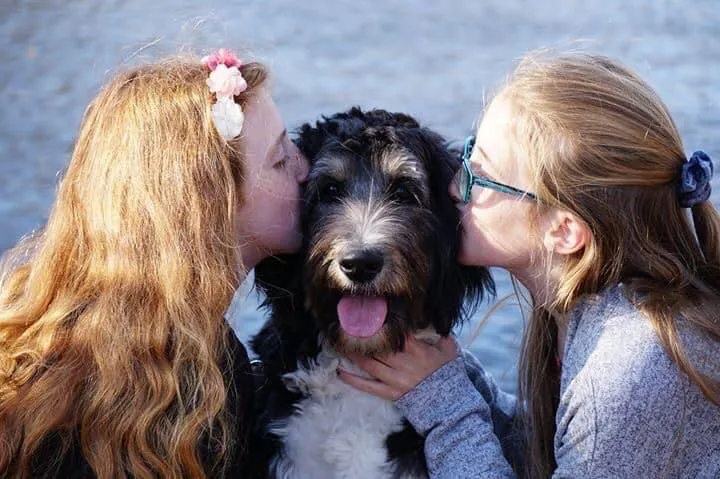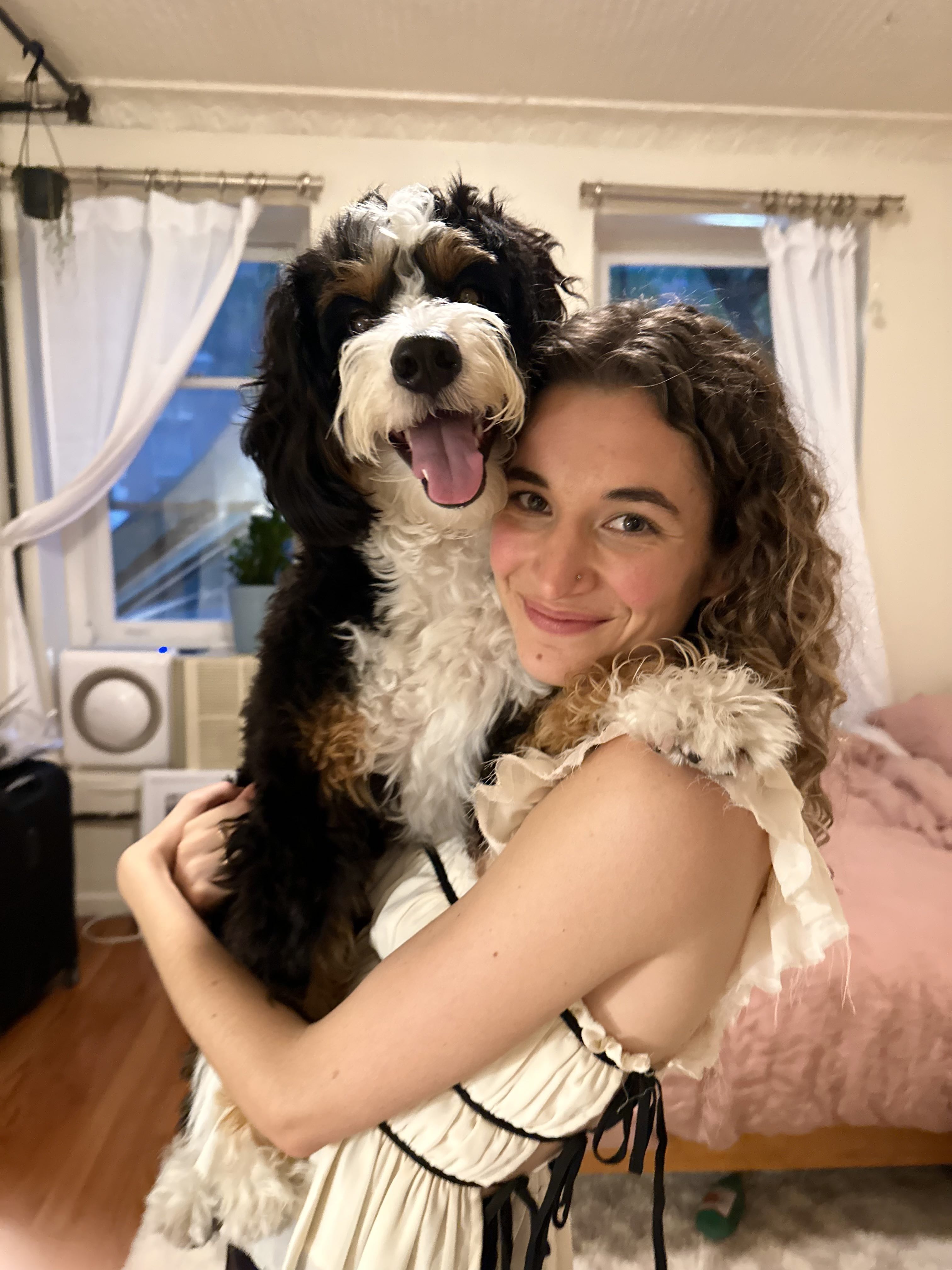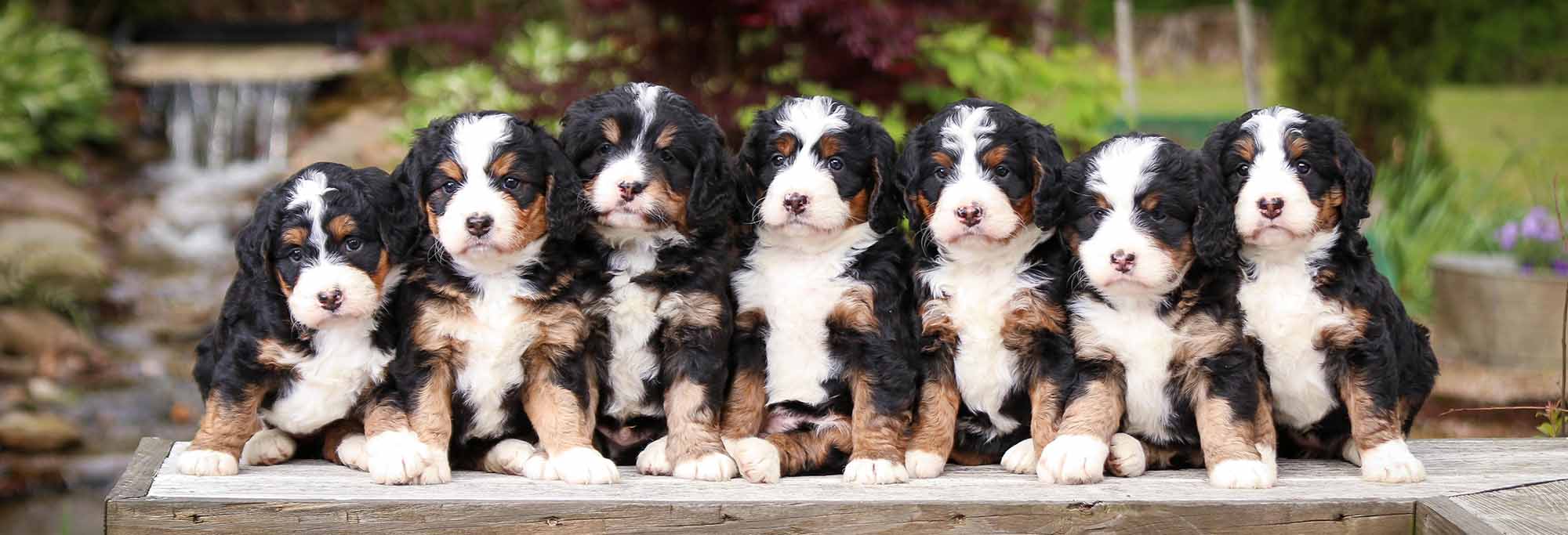Are Bernedoodles really Hypoallergenic? What allergy suffers need to know

The truth about hypoallergenic Bernedoodles
You might be wondering what's up with all the talk about hypoallergenic dogs. I am sure you have asked yourself, “Do they actually not shed, and are they really the answer for my allergies?”
I often get the million dollar question, “Are Bernedoodles really hypoallergenic?” The simple answer is, "Yes". Bernedoodles are considered hypoallergenic. There is, however, much more to that answer than a simple yes. We have found that most people with allergies do well with the Bernedoodle if they get the right puppy, but not all Bernedoodles are equally hypoallergenic or equally a good fit for those with allergies.
You might be surprised at what “hypoallergenic” actually means. We’ll explore the subject a bit and help you get a good idea what to look for when searching for a puppy that you and your allergies can live with.
What Does “Hypoallergenic” Actually Mean?
It's not unusual for people to think that a hypoallergenic dog will not cause any allergic reactions at all, or even that they will have no shedding. While this might be the case with some dogs, it is certainly not the normal in most cases.
The simple description of a hypoallergenic dog is that it will be less likely to trigger allergies compared to other breeds. Dog allergies aren’t caused by fur itself. Instead, the main culprits are proteins found in a dog’s dander (tiny flakes of dead skin), saliva (which dogs transfer to their coat when they groom themselves), and urine. When dogs shed fur or dander, these proteins can become airborne and trigger allergic symptoms in the human family.
So, when we say our dogs are “hypoallergenic”, we really mean that they tend to produce fewer allergens or shed less dander, making them easier for allergy sufferers to tolerate. Unfortunately, it doesn’t mean they’re always completely allergen-free.

Why Bernedoodles Are Considered Hypoallergenic
Bernedoodles are a cross between a poodle and a Bernese mountain dog. Poodles shed very little while the Bernese mountain dog is quite the opposite - it sheds excessively!
Poodles have a single coat and have low-shedding, curly coats. This coat traps dander and hair instead of releasing it into the air, helping minimize allergic reactions. On the other hand, the Bernese mountain dog has a thick double coat, straight hair, and sheds a lot year round. This means that it produces significant amounts of dander.
The amazing thing about crossing these two breeds is that most of their offspring tend to inherit the hypoallergenic properties of the poodle coat. However, because Bernedoodles are hybrids, their traits can vary quite a bit depending on genetics. We have found that puppies can vary a lot even within the same litter.
If you're interested in learning more about hypoallergenic coats, places like AKC and The Doodle Pro are great places to get more info.
The Different Coat Types in Bernedoodles
Bernedoodles come in three main coat types — each with different allergy potential and grooming needs.
The Curly Coat
The curly coat is the most similar to the poodle's coat. These tight curls trap hair and dander. They are the lowest shedding and are the best for allergies. As can be expected, they require regular grooming to prevent matting.
The Wavy Coat
The wavy coat is the most common and popular one in Bernedoodles. While it might not be the right choice for someone that has major allergy issues, we have found that most people with moderate allergies do well with puppies like this. This wavy coat often has low shedding and is easier to maintain than the curly one.
The Straight Coat
The straight coat more closely resembles the Bernese Mountain Dog. It is usually the least hypoallergenic type and has more shedding and dander spread. It is usually still much more hypoallergenic than it's Bernese parent.
If allergies are a concern to you, look for a puppy with a curly or wavy coat.
The Role of Genetics: F1, F1B, and F2 Bernedoodles
The type of coat a bernedoodle has is largely affected by their genetics. We classify them by generation.
F1 Bernedoodle (First Generation)
F1 Bernedoodle (First Generation) are 50% Bernese Mountain Dog + 50% Poodle. These coats usually range from wavy to curly. Some may shed lightly but others shed very little. Allergy friendliness can vary a lot from one puppy to another.
F1B Bernedoodle (Second Generation
F1B Bernedoodle (Second Generation) are F1 Bernedoodles bred back to a Poodle, making them about 75% Poodle and 25% Bernese. These are usually the most allergy-friendly generation because they tend to inherit more of the Poodle’s curly, non-shedding coat. It's always important to look at each individual puppy. We’ve had F1B puppies that had straighter hair than most of our F1 puppies do. So understanding the differences is key!
F2 Bernedoodle (Second Generation Cross)
F2 Bernedoodle (Second Generation Cross) are two F1 Bernedoodles bred together. The coat types in this group are often less predictable, so they may not always be the best option for people with allergies. A good breeder will be able to help you get a good idea what the puppies will be like as they mature to adults.
.jpg)
Managing Allergies Around Bernedoodles
If you have a low shedding Bernedoodle and you are still experiencing some allergic reactions, there's things you can do to significantly reduce exposure to the allergens.
Regular Grooming:
- Regular grooming and bathing is a big one. This helps control dander and loose hair.
- Use a slicker brush or dematting comb for curls, and bathe your dog with a gentle, hypoallergenic shampoo every few weeks.
- Regular grooming by a professional every 6–8 weeks helps too.
Keep Your House Clean:
- Keep your home clean.
- Vacuum frequently with a vacuum that has a HEPA filter to capture dander and allergens and wash the dog bedding weekly in hot water.
- You might want to use an air purifier in the rooms your dog spends the most time in.
- If you live closely with your pooch, you might have to avoid letting him sleep on your bed if your allergies are severe.
Watch Out For Kisses:
- Remember that saliva can trigger allergies too.
- If your dog is affectionate and licks you often, simply wash the area afterward to prevent skin irritation.
If you’re unsure how you’ll react to a Bernedoodle, see if you can find a friend or someone that would allow you to spend some time with their dog. We welcome our customers to come spend time with the puppies and see how they respond to them. It's so much fun to see someone that is usually allergic to dogs play with the puppies and have them lick them all over without getting reactions!
One such instance that comes to my mind is the day we had a mother with her twin daughters come spend time with the puppies. They so badly wanted one of our adorable tricolored babies, but knew they had to make sure they wouldn't react to them. They spent a bunch of time playing with them, rubbing them on their skin, and letting them lick them all over. Much to all of our joy, the allergy reaction was very minimal and they were able to take home a puppy. Happy girls! 😄
If your allergies are severe you might even want to consider having allergy testing done to confirm which proteins trigger your symptoms.
FAQs About Bernedoodles and Allergies
1. Do Bernedoodles shed a lot?
Most Bernedoodles, especially curly-coated ones, shed very little. Wavy or straight coats may shed more, but still usually far less than a Bernese Mountain Dog.
2. Are Bernedoodles better for allergies than Goldendoodles?
Both breeds can be allergy-friendly, but Bernedoodles often have slightly thicker coats. The real difference comes down to the generation and coat type rather than the breed itself.
3. Can Bernedoodles live comfortably with someone who has dog allergies?
Yes, many people with allergies live happily with Bernedoodles. We have lots of happy customers that do well with their Bernedoodles. Just be sure to choose a low-shedding coat, maintain regular grooming, and keep your home clean.
4. What size Bernedoodle is best for allergy sufferers?
Size doesn’t directly affect allergen levels, but smaller Bernedoodles (like Mini or Tiny) naturally produce less dander overall, which can make them slightly easier for allergy sufferers to live with.
5. Can you completely eliminate dog allergies with a Bernedoodle?
No breed can completely eliminate allergies. However, with the right dog, good cleaning habits, and perhaps a HEPA air filter, you can greatly minimize your symptoms.
6. Are Bernedoodles Good for People With Severe Allergies?
This depends on the individual and the specific Bernedoodle. Some people with severe allergies do fine with curly-coated Bernedoodles. Others may still react to the dander or saliva proteins regardless of coat type.
Final Thoughts
We believe that Bernedoodles are one of the most lovable, intelligent, and adaptable designer breed around. For many families they’re a wonderful option for those with mild to moderate allergies!
Remember that “hypoallergenic” doesn’t mean “no allergens.” It means much less likely to cause reactions. If you’re considering adding a Bernedoodle to your home, spend some time with the breed first and work with a knowledgeable breeder who can guide you toward a puppy with the right coat for you.
Jump over to our Available Puppies page and get a good look at these different types of puppies we are talking about!





